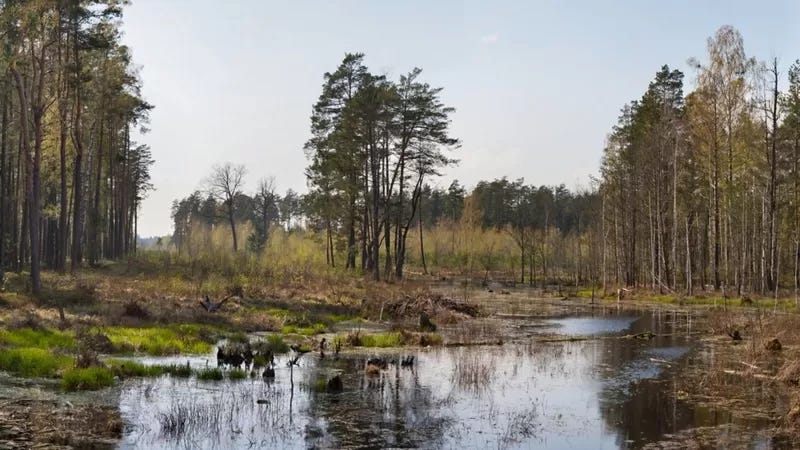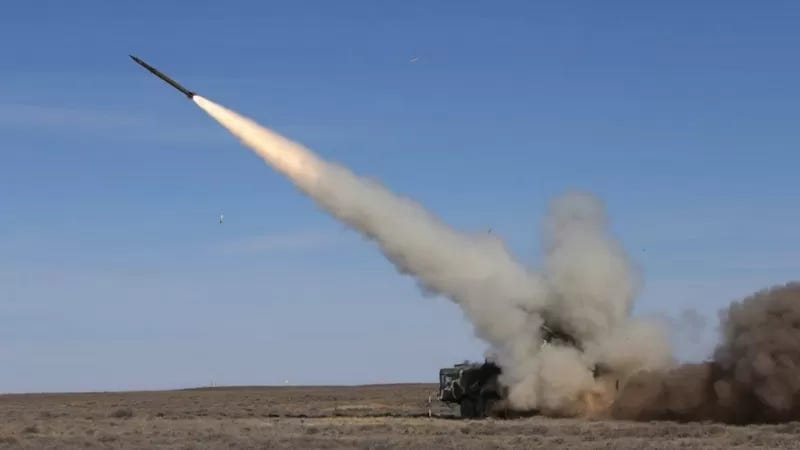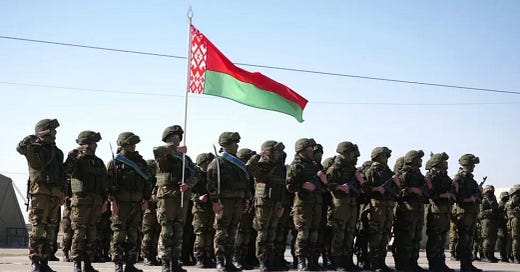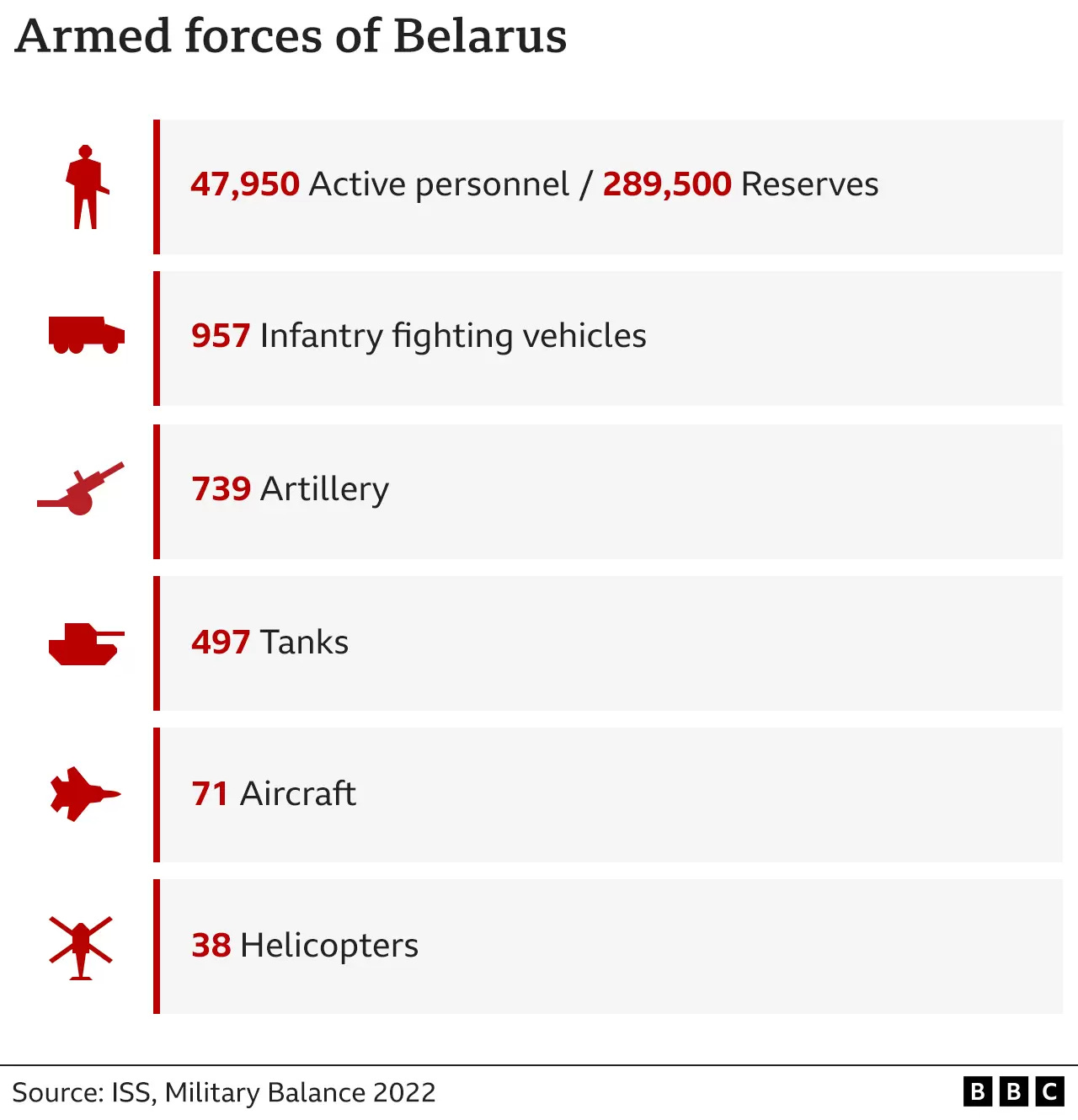Ukraine war: Could Belarus join the fighting on Russia's side?
Belarus President Alexander Lukashenko has announced the creation of a joint force of troops with Russia. Does this mean that Belarus will enter the war?
The leaders of Russia and Belarus have announced the creation of a joint task force. Belarus President Alexander Lukashenko has repeatedly claimed that Ukraine is preparing to attack his country, justifying the possibility of Belarus directly entering the war.
The question that military experts and politicians in Ukraine and allied countries are all asking: how likely is it that the Belarusian army will directly participate in the conflict on the side of the Russians? Is there a possibility of a new Russian attack from Belarus, perhaps in a renewed attempt to strike Kyiv?
The BBC spoke with political and military analysts about the probability - and prospects - of such a development.
How many Russian troops are in Belarus?
Potential new offensives from Belarusian territory have been under discussion all summer, but the Ukrainian Armed Forces reported that the situation in regions bordering Belarus was 'without significant changes'.
However, this autumn Russia restarted its efforts to deploy troops into Belarusian territory and the situation became more concerning with the announcement of Russian mobilisation. According to Ukrainian intelligence, Belarus is expecting 20,000 newly mobilised soldiers from Russia.
On 10 October, the day of a huge rocket strike on Ukraine (with some rockets launched from Belarus) Alexander Lukashenko announced the creation of a joint task force with Russia.
Until recently, the Russian contingent in Belarus was 1,000 soldiers, including maintenance specialists for six attack planes, signalmen for radar stations, and crew for four Iskander tactical missile systems and 12 S-400 anti-aircraft systems.
It remains unclear how much these numbers have changed, although the head of the Belarusian department for military cooperation, Valery Revenko, claims there are 9,000 men.
If the photos appearing on the internet are to be trusted, recently mobilised Russian soldiers are being deployed to Belarus.
On 17 October, Belarus announced that around 170 tanks, up to 100 guns and mortars over 100mm in calibre, and 200 combat vehicles would be sent from Russia as part of the new joint force.
According to the opposition Telegram channel, Belarusian Hajun, trains of Russian soldiers will arrive in the central and northern regions of Belarus - not the territory bordering Ukraine.
How does this threaten Ukraine?
Alexander Kovalenko, a military and political commentator from the 'Information Resistance' project, noted that to threaten Ukraine with a full-scale invasion, Russia would have to concentrate no fewer than 40 battalion tactical groups in Belarus.
In this scenario, we are looking at between 24,000 and 28,000 soldiers. This is roughly the size of the force which invaded Ukraine from Belarus in February.
So if there are now only 9,000 soldiers, this would represent no more than 12 battalion tactical groups. As Kovalenko notes, these are not full-scale battalions, but marching battalions without equipment.

"This is more of a distraction than grounds for real panic," he notes.
Be that as it may, if the Russian contingent in Belarus started to grow rapidly without warning, there would be a strong chance that Russia is preparing an invasion with unmotivated, poorly-trained new conscripts.
Are there enough soldiers for an invasion?
Ivan Kirichevsky, an expert at the Ukrainian Internet site Defence Express, told the BBC that it's still too early to be discussing this.
"Only when the Russian troops on the other front are so worn out that they can barely hold their defence will the Kremlin give the order to attack, to restrain the advance of Ukrainian forces."
However, Kirichevsky doubts that Russia will be able to gather sufficient troops to manage a further offensive from the north.
He says there is a telling comparison to be made with the Russian attempt to form a third battle corps, which was supposed to be ready for combat by mid-August. The corps was only ready for combat in September, and remained in an incomplete state.
"They weren't ready, so the Ukrainian army dealt with them, especially in Kharkiv," notes the expert.
Is Ukraine prepared for an attack from the north?
Lieutenant General Sergei Naev of Ukraine explained Russia's successes in the northern Ukraine at the beginning of the war. According to him, the majority of existing Ukrainian troops were occupied with the Donbas conflict, and during peacetime, the units on the Belarusian border were not staffed to a level sufficient to resist a full-scale attack.
Another factor was an incident just two days before the invasion, when Belarusian Minister of Defence, Victor Khrenin, gave his 'word as an officer' to his Ukrainian counterpart, Alexei Reznikov, that there would be no attack from Belarus - empty words. Reznikov confessed this himself, in an interview with the Washington Post.

General Naev says that Ukraine is now ready for an attack from Belarus. "The troops mustering in Belarus will increase our readiness. The Ukrainian command will build up our own forces and materiel accordingly," he explains.
Authorities in the regions bordering Belarus are also discussing combat readiness.
Vitaly Koval, leader of the military-civil administration of the Rivne region of Ukraine, which shares a 218km border with Belarus, told BBC Ukrainian that work on strengthening border defences began seven months ago.
According to Koval, an invasion from the north would not be easy. "Forty percent of our territory is covered by forests. And there are impenetrable forests and swamps in the northern areas on the Belarusian border. Not to mention 170 rivers. These are natural barriers to enemy equipment. Bridges over rivers can be blocked in many ways, and impede enemy movement."
"You'd have to be suicidal to go to war with us across the Belarusian-Ukrainian border," he adds.
Would the Belarusian army join the war on Russia's side?
At the end of last year, there were 17,000 soldiers in the Belarusian ground forces, the lion's share of which were conscripts.
The Belarusian army has both armoured vehicles and aviation and according to Ivan Kirichevsky, a Belarusian offensive has the potential to do real damage.
However, the troops have no combat experience.
Belarusian officials, including Lukashenko himself, have repeatedly stated their unwillingness to attack Ukraine. However, recalling Khrenin's words from 22 February, such promises are hardly guarantees.
Is Belarusian mobilisation possible?
A few days ago, an article appeared in the Belarusian opposition newspaper Nasha Niva headlined 'The decision to mobilise Belarus has been made'.
The journalists, citing their own sources, claimed that Lukashenko had made the fundamental decision to carry out a covert mobilisation in Belarus to complete Russian units. According to the authors, this increases the likelihood of escalation on the Belarusian-Ukrainian border.
This information was confirmed by the General Staff of the Ukrainian Armed Forces.
"Under the guise of training camps, covert mobilisation activities are taking place within the Belarusian Armed Forces. According to the available information, operators of anti-aircraft missile systems and tank crews are being trained," the General Staff said.
Officially, Minsk has not announced mobilisation, and Lukashenko recently denied that any such plan existed.
Will the Belarusians fight?
Oleksiy Arestovych, adviser to the head of Zelensky's office, said that although there is indeed a partial covert mobilisation in Belarus, this mainly targets military personnel who specialise in construction.
"That is to say, the main task for the Belarusian side won't be to fight against us, but to build some kind of shelter for Russian troops," he said, in a broadcast for the YouTube channel, 'Feygin Live'.
Arestovych is convinced that the probability of direct Belarusian army participation in the war against Ukraine is not zero, but remains extremely low.
For many military observers, one indication of the Belarusian army's reluctance to enter the war directly is the export of weapons and ammunition from the Belarusian arsenal to Russian divisions.
Kirichevsky believes that in so doing, Lukashenko is trying to buy his way out of direct Belarusian involvement against Ukraine.
The bloggers behind the Telegram channel 'Belarusian Hajun' also think that direct involvement is just one of many ways the scenario could play out.
It is possible that Belarus's participation will be limited to preparing a Russian strike group on its territory, supplying weapons and allowing the training of Russian conscripts at Belarusian camps - and so exclude the involvement of its own troops.
However, some remain convinced that the Belarusian army are bound to enter the war sooner or later.
Taras Chmut, head of 'Come Back Alive,' a Ukrainian military aid fund, commented on the potential appearance of Russian Iskanders and S-400s in the Belarusian army. "They will join the war. Either that, or we'll win much sooner and the Russian Federation will fall apart."
And what of the mood in Belarus? An individual who spoke anonymously with BBC Ukraine journalists who has relatives in the Belarusian army made the following statement: "The Republic of Belarus doesn't want to fight. And it won't."
Read this story in Russian here.
Based on the article by BBC Ukraine.
Translated by Pippa Crawford.







